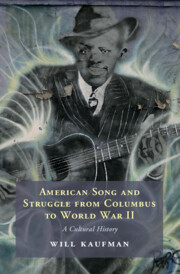Book contents
- American Song and Struggle from Columbus to World War II
- American Song and Struggle from Columbus to World War II
- Copyright page
- Praise for American Song and Struggle
- Dedication
- Contents
- Figures
- Preface
- Acknowledgments
- Introduction
- Chapter 1 Broken Spears and Songs of Sorrow
- Chapter 2 Good Newes from Virginia
- Chapter 3 A Capital Chop
- Chapter 4 If I Had but a Small Loaf of Bread
- Chapter 5 Where Today Are the Pequot?
- Chapter 6 There Is a Fountain Filled with Blood
- Chapter 7 A Tragedy That Beggared the Greek
- Chapter 8 Muscle, Blood, and Steel
- Chapter 9 Rule Anglo-Saxia
- Chapter 10 The Hand That Feeds You
- Chapter 11 We Are Many
- Chapter 12 100% American
- Chapter 13 We’re Up Against It Now
- Chapter 14 The Panic Is On
- Chapter 15 To Thee We Sing
- Conclusion
- Notes and Sources
- Song Index
- General Index
Chapter 4 - If I Had but a Small Loaf of Bread
Published online by Cambridge University Press: 30 July 2022
- American Song and Struggle from Columbus to World War II
- American Song and Struggle from Columbus to World War II
- Copyright page
- Praise for American Song and Struggle
- Dedication
- Contents
- Figures
- Preface
- Acknowledgments
- Introduction
- Chapter 1 Broken Spears and Songs of Sorrow
- Chapter 2 Good Newes from Virginia
- Chapter 3 A Capital Chop
- Chapter 4 If I Had but a Small Loaf of Bread
- Chapter 5 Where Today Are the Pequot?
- Chapter 6 There Is a Fountain Filled with Blood
- Chapter 7 A Tragedy That Beggared the Greek
- Chapter 8 Muscle, Blood, and Steel
- Chapter 9 Rule Anglo-Saxia
- Chapter 10 The Hand That Feeds You
- Chapter 11 We Are Many
- Chapter 12 100% American
- Chapter 13 We’re Up Against It Now
- Chapter 14 The Panic Is On
- Chapter 15 To Thee We Sing
- Conclusion
- Notes and Sources
- Song Index
- General Index
Summary
The USA is born as a site of intense struggle in and out of the musical realm. Escapees from slavery sing of such heroes as the maroon leader Jean St. Malo, songs are sung over “The Rights of Woman,” and the labor movement produces its first store of agit-prop songs. As the Indigenous peoples of the east stare into the face of settler-colonial encroachment, the nascent music industry erupts with sentimental songs about the “Noble Savage” and the “Vanishing Indian.” Partisans of John Adams and Thomas Jefferson fight their battles through song, and the Louisiana Purchase doubles the size of the USA and the territory for musical conflict. The rise of the “Injun Fighter” has its own soundtrack, eliding the continued seizure of Indigenous territory. The War of 1812 gives birth to “The Star-Spangled Banner,” while the songs of conscientious objectors are pushed to the margins. Blackface minstrelsy emerges as one of the greatest cultural challenges to Black American self-definition. Meanwhile, eastern cities are bursting at the seams with the steady influx of European immigrants, and the hawks of Manifest Destiny look westward to Texas, Mexico, and beyond, buttressed by shrill musical calls to “Remember the Alamo!”
Keywords
- Type
- Chapter
- Information
- American Song and Struggle from Columbus to World War 2A Cultural History, pp. 61 - 86Publisher: Cambridge University PressPrint publication year: 2022

